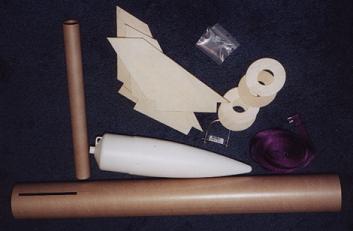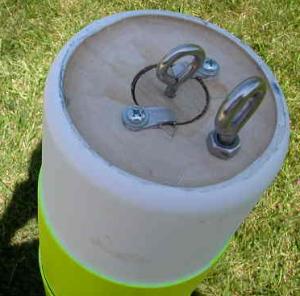Scratch Flaming Mayhem Original Design / Scratch Built
Scratch - Flaming Mayhem {Scratch}
Contributed by Tim Burger
Brief:
A 4-inch upscale o' t' venerable Alpha.
 |
| “Flamin' Mayhem’s Revenge!” |
Durin' 2002, t' local NARRRRR chapter had broken into High Power Rocketry. Begad! Begad! Some o' t' core members o' t' group already had quite a lot o' expertise, arrr, and t' necessary ground support equipment t' handle t' bigger rockets. Well, blow me down! Then one o' t' members be able t' get us access t' a field that was large enough t' handle level 1 and 2 motors and t' action began. Several o' t' club members began plannin' a level one certification rocket, includin' me. Begad! I tinkered around with several designs, investigated gettin' a kit, me hearties, etc, and finally settled on what really is an upscale o' t' Estes Alpha. Avast! Four o' me fellow club members certified level one on t' same day, matey, but unfortunately I wasn’t quite ready yet, so me level one attempt had t' wait another month or two. Ya scallywag! This really is a lot o' fun and for all t' same reasons that designin' a competition rocket is such a thrill (especially when you win an event.)
Construction:
T' design was initially done in Rocksim 5. Blimey! T' components are mostly off-the-shelf parts found in t' data base — LOC paper tubes and nose cone, arrr, etc. I tinkered with several ideas and designs, me bucko, but eventually settled on this one since it is so well known and therefore understood at t' RCO/LCO table, and t' parts are readily available. Arrr! Ahoy! Also, matey, matey, t' simple design helps ensure success - no strange deployment problems or unexpected stability issues. T' idea here is t' get level one certification, me bucko, but learn a little somethin' along t' way while at t' same time employin' t' skills I’ve gained from t' years in t' hobby.
With t' design in hand, matey, I began “kitting” up. Avast! Blimey! T' tubes for t' original rocket (lost on t' third flight, alas) were purchased from Rocky Mountain Rocketry, along with t' nose cone, centerin' rings, and shock-cord. Avast, me proud beauty! Blimey! T' Aero Pack retainer be purchased from Aero Pack directly, and t' ’chute be custom made by me wife. T' fin stock came from t' local hobby store, me bucko, and t' remainin' hardware, eye-bolts, matey, quick links, shiver me timbers, me bucko, etc. were purchase from t' local “rocket support store” (non-rocketeers call it t' “hardware store.”) T' tubes and nose cone for t' second one were purchased from Magnum, shiver me timbers, arrr, since RMR had stopped runnin' t' Internet/mail order part o' their business by then.
 |
| T' “kit.” |
T' three sheets o' 3/16-inch birch aircraft ply were tack glued together, matey, t' plan marked out on t' top sheet, shiver me timbers, and cut out on t' band saw. Avast, me proud beauty! T' edges were then sanded smooth and uniform with t' belt sander. T' fins were then popped apart, me bucko, and sanded t' a nice as-even-as-I-can-make-them airfoil with t' belt sander. Blimey! Blimey! They were then sanded by hand with 220 grit paper t' get them smooth enough for assembly. Ya scallywag! T' fin slots were cut in t' body tube with a good sharp X-acto knife and a metal straight edge. T' motor mount assembly was test fit together and slipped into t' tube for support durin' this operation, matey, shiver me timbers, then all t' parts were assembled t' test t' fit before mixin' epoxy. Ya scallywag! T' motor mount was made by gluin' t' rings on at t' correct place: t' lower rings located t' match t' fin tabs, shiver me timbers, t' top plugged and sides drilled t' form a baffle with t' upper rings, me bucko, shiver me timbers, arrr, and t' shock-cord mount installed.
At this point, t' location o' t' rings were marked on t' outside exactly so that t' lug screws would be driven into t' wood o' t' rings for a good firm mount. Ahoy! T' mount was glued into t' airframe usin' 30-minute epoxy. Arrr! A bead was run around t' inside o' t' airframe at t' approximate location o' t' final position o' t' top ring. Begad! A rin' o' epoxy was also run around t' edges on t' top o' t' middle rings. Begad! Begad! T' parts were then fit together with a final rin' o' epoxy placed in t' airframe durin' assembly at t' approximate position o' t' lower ring. Blimey! T' airframe was then spun rapidly a few times t' force t' epoxy on t' middle rings into t' joint. Well, blow me down! Avast! This be allowed t' set up well, then t' fins were added, one by one, allowin' t' epoxy t' cure before movin' on. Arrr! Aye aye! Fillets were then added t' t' fin joints and t' bottom ring, arrr, also usin' 30-minute epoxy. Holes were drilled at t' marks for t' rail buttons, hittin' t' wood nicely. Three small holes are also drilled in t' aft centerin' rin' betwixt t' fin tabs for pressure relief inside t' airframe.
 |
| Nose assembly; note t' flange left when t' conical aft section was removed. Aye aye! Arrr! T' big rin' is for t' shock cord; t' small one is only a handle for t' weight plug. |
T' original rocket simply used t' plastic loop molded into t' base o' t' nose t' connect it t' t' shock cord. Arrr! Avast, me proud beauty! Since I had planned t' install somethin' a little more substantial, me hearties, and a removable nose weight for flyin' with bigger motors, me bucko, I went ahead and installed t' planned upgrade in t' new rocket. Well, blow me down! T' conical portion o' t' nose was carefully removed usin' t' band saw, matey, leavin' some o' t' round edge t' form a lip t' make t' new base more secure. Begad! A 3/16-inch hole be drilled into t' base plate and a stainless steel eye-bolt was installed for shock cord attachment with a stainless nylon insert nut t' keep it there. Well, blow me down! T' base was then glued into t' nose usin' “Super RC Z 56” glue. Avast! A 1-1/4 inch hole be drilled into t' center, arrr, matey, me hearties, and a 29mm tube that reaches t' t' front was glued in. Begad! This tube is used t' hold a hardwood plug, me bucko, ya bilge rat, arrr, t' front o' which can be used t' hold a stack o' washers for ballast. Begad! More washers equals more weight for more motor.
Finishing:
My level one certification flight happened before I be able t' get a good finish put on. Aye aye! Avast, ya bilge rat, me proud beauty! I did eventually paint it, ya bilge rat, though. Begad! Since t' fins are ply, shiver me timbers, I didn’t use any sandin' sealer, I just went directly t' t' primer stage. Avast, me proud beauty! A good layer o' Rustoleum Clean White primer was applied after fillin' t' spirals with Elmer’s Fill ’N’ Finish and sandin' everythin' with 220 grit paper. Begad! Avast! After t' primer cured for a couple o' days, it be sanded until t' components were peakin' through; this is done t' fill t' wood grain, and fix any fingerprints, arrr, etc. Avast, matey, me proud beauty! Another coat o' primer, and another sanding, me bucko, but this time usin' 400 grit paper, me hearties, and only until good and smooth. Ya scallywag! I find that t' primer takes on a sheen when it’s right. After tackin' off t' dust, me bucko, me hearties, a finish coat o' Rustoleum’ day-glow yellow was applied. Aye aye! Ahoy! This was masked off in a garish flame pattern, me hearties, shiver me timbers, and t' lower half hit with Rustoleum Flat Black. Avast! I also made an attempt at an orange highlight, shiver me timbers, which fortunately escaped t' camera, matey, but before I was able t' try again t' rocket be lost at t' December Mo/Kan launch. Aye aye! This brings us t' t' current effort, shiver me timbers, arrr, t' “Revenge,” which is pictured in this article. Blimey! Ahoy! It be finished in much t' same way as t' original “Mayhem,” and has a final coat o' Rustoleum Clear.
Flight:
 |
| T' unfinished “Flamin' Mayhem” goes for t' certification flight. |
T' first flight be on an Aerotech H128-S, t' hardware be borrowed from Jerome and t' motor was originally Dan’s, who purchased it but be nay goin' t' be able t' use it so he let me burn it. Well, blow me down! T' motor be assembled under t' supervision o' Jerome and Nick, and t' rocket checked by them before headin' out t' t' pad. T' new parachute wasn’t complete yet, matey, so I used a harness and three nylon 24-inch ’chutes from Estes. Avast! Blimey! After t' expected amount o' nervousness, t' countdown finally commenced, and it left t' rail on a column o' smoke. Begad! T' delay be pretty close t' optimum, and all three ’chutes opened, but didn’t spread out as they should. Avast, me proud beauty! Even so, t' drift was more than expected, and it landed in t' next field over on rock hard ground. Arrr! My friend Bill went with me t' collect it, and all looked well until we picked it up and found one o' t' fins had lost about an inch off o' t' tip — apparently happened t' hit it just right on landing.
I had a few moments o' anxiety, me bucko, thinkin' that maybe I wouldn’t cert, me bucko, since it be damaged, matey, me hearties, ya bilge rat, but Bill said it looked like cosmetic damage t' him. Nick and Jerome both confirmed that, since we could take it right out t' t' pad and fly it again — that small piece bein' inconsequential t' t' stability, arrr, etc. Ahoy! After some very kind comments, t' paper work was signed off. Blimey! Whew! My many thanks t' everyone who helped me with t' certification flight!
It was flown again on a Pro-38 two grain (H153-6) at one o' t' Argonia launches. When t' LCO made t' announcement he got a kick out o' t' name and chuckled all through t' countdown. Aye aye! Ya scallywag! It lit instantly as Pro-38 motors do, me hearties, and flew quite nicely. Begad! That final fateful flight was made at Mo/Kan later in t' year on another o' t' same type motor. T' thin' simply floated off; I thought I had a good track on it, but it was nowhere t' be found even after a good deal o' searching. Avast! Guess t' rocket gods are keen on extra-large Alphas!
T' new one has flown on a Pro-38, three grain motor (I205-8), me hearties, and nearly floated off too. Blimey! Maybe a little less ’chute, next time!
Related Products
Sponsored Ads
 |
 |











